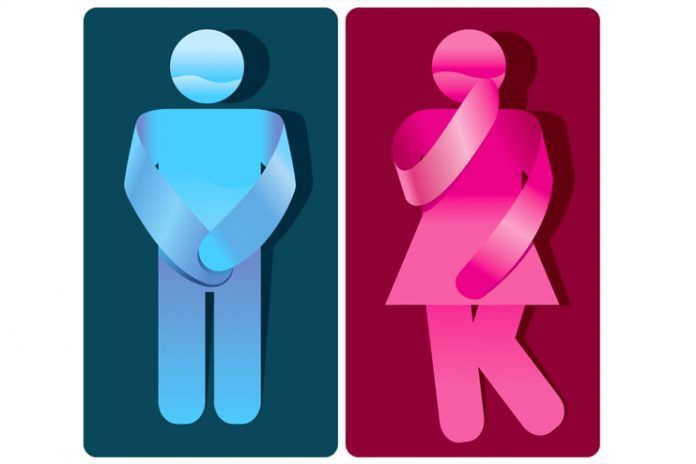Affiliate Disclaimer
Some links in this article are affiliate links. We may earn a small commission if you make a purchase through these links, at no extra cost to you. We only recommend products we find useful to our readersWould it not put you in a pickle if you would experience an involuntary action that could possibly embarrass you? Having said, just imagine you are urinating involuntarily and by the time you could do something about it, you have already passed urine and it get’s too awkward. What is this all about must be your question. Is it not?
Urinating without voluntary wanting to is an issue termed as Urinary Incontinence or in other words overactive bladder. Not many are open about discussing it as they find it embarrassing. One must not get too bothered as it is common and happens with a lot of people across the globe. Looking at the condition in the US, there are about 17 million people who face this problem.
Talking of a statistical study from The National Association Of Continence, about 17%of women who are 18 and above go through overactive bladder. Taking an estimate, there are 17 million people in the US who face Urinary Incontinence.
This article aims at answering all your questions on Urinary Incontinence and it will further educate you on the causes, symptoms and ways to deal with this problem.
What Is Urinary Incontinence?
Urinary Incontinence is an uncontrolled flow of urine that is not felt by a person, this situation leads to a weak urinary sphincter that makes a person lose control and unknowingly urinate.
Urinary Incontinence is not just seen in the elderly folks but it is common among the youngsters as well. It is most commonly seen in the case of women.
However, it is more likely to happen to elderly people. When the muscles around the urinary bladder do not function right, it leads to bladder control problems.
Types Of Urinary Incontinence
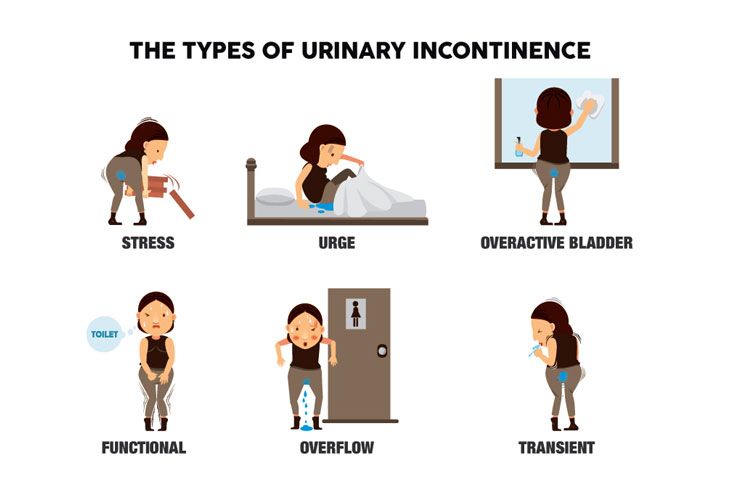

There are five types of Urinary Incontinence
- Type 1 – Stress Urinary Incontinence
- Type 2 – Urgency Urinary Incontinence
- Type 3 – overflow urinary Incontinence
- Type 4 – Total Incontinence
- Type 5 – Functional Incontinence
1. Stress Urinary Incontinence
When a person applies force on their urinary bladder because of certain activities such as coughing or laughing it is stress urinary incontinence.
2. Urgency Urinary Incontinence
When a person feels the need to urinate immediately and when a person tends to urinate unknowingly this is Urgency urinary incontinence.
3. Overflow Incontinence
When a person’s bladder is full yet he/she is unable to urinate well leading to the leakage of small amounts of urine it is overflow incontinence.
4. Total Incontinence
When a person is not able to store urine at all it is total incontinence.
5. Functional Incontinence
This kind of urine incontinence on a majority happens with elderly people who find it difficult to control their urine and cannot reach the washroom on time.
Causes Of Urinary Incontinence
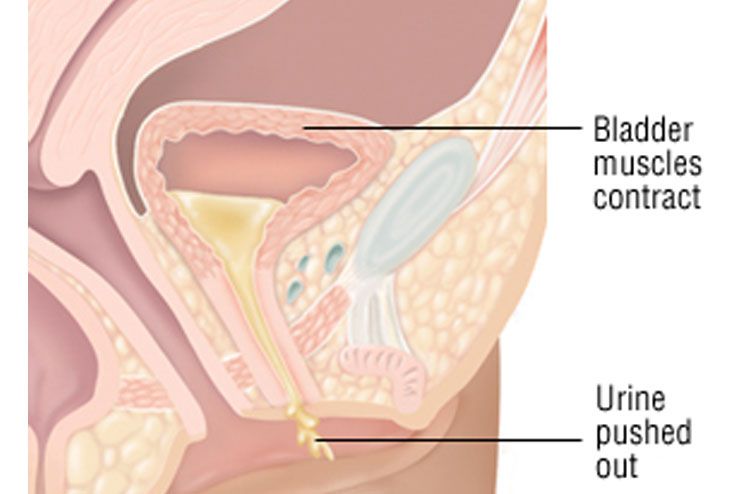

Urinary Incontinence can be cured with medication and in case it is not getting cured with medication it is because of weakness in the bladder. The causes of Urinary Incontinence is further sub divided into stress and urgency urinary incontinence.
Let’s study about how urinary incontinence is caused in detail.
1. Stress Triggers on the Bladder
These activities possibly trigger stress on your bladder and can be one of the reasons for urinary incontinence.
- Exercising
- Coughing
- Sneezing
- Lifting weights
- Laughing
Having said, it is not important that these activities may trigger urinary incontinence all the time. However, these could be one of the causes.
2. Weak Urinary Sphincter
Urinary Incontinence is caused because the urinary sphincter and other muscles surrounding your bladder become weak.
Reasons for urinary sphincter to lose strength are as follows :
- It is caused during pregnancy and child birth
- During menopause because of the dip in the estrogen levels, the tube that makes the urine pass out of the body becomes thin and causes Urinary Incontinence
3. Hysterectomy
When a woman’s uterus is removed, the bladder is extremely active and this further leads to a transformation in the pelvic floor muscles and causes Urinary Incontinence.
4. Old Age
In old age, urinary incontinence is at a higher rate. It happens because the muscles around the urethra do not work well.
5. Urinary Tract Infections
The bacteria causing infection and inflammation in the urethra and this causes discomfort in the bladder and one feels the need to urinate every now and then.
6. Feeble Pelvic Floor Muscles
Pelvic floor muscles weaken if there is a pressure put on the abdomen and pelvic muscles. Pressure s applied on the abdomen due to coughing, sneezing, lifting weights, excessively bending and during child birth.
7. Over Active Bladder
The bladder muscles contract when the bladder gets over active.
8. Pressurize Fatty Tissues on the Bladder
Being overweight can be one of the reasons to put pressure on the fatty tissues on the bladder and can, in turn, make your pelvic floor muscles weak.
9. Damaged Nerves(Multiple Sclerosis)
When one of the nerves in the brain that controls the bladder is disrupted then there are chances that it can cause urge incontinence.
10. Parkinson’s Disease
Not every person having Parkinson suffers with the inability in the nerves to pass on a message to the brain that controls the bladder. However, in some cases the brain fails to do so which in turn leads to urinary incontinence.
11. Diabetes
Diabetes can be a hindrance to the blood vessels and nerves which can further lead to problems in the bladder such as overactive bladder and urinary infections causing urinary incontinence.
12. Benign Prostatic Hyperplasia
This is an enlarged prostate that is seen in men and does not allow urine to pass through the bladder causing urinary incontinence.
13. Arthritis
When a person is suffering from arthritis it gets difficult to keep a voluntary control on urine because the urine gets concentrated and causes discomfort in the bladder and increases the probability of urinating more often.
14. Disturbed Pelvic Area
When the pelvic organs are disturbed and there is a change in their positioning, it has a direct impact on the functioning of the bladder and urethra and leads to urine leakage.
15. Lung or Esophageal Cancer
A person who is often coughing because of being a victim of esophageal cancer is likely to experience urinary incontinence.
16. Urolithiasis
When there is a stone formed in the kidney and it is expanding and blocking the bladder it leads to urinary incontinence.
17. Spinal cord injury
Because of an injury in the spinal cord, the nerves that want to communicate with the spinal cord to keep the bladder in control may not be able to do it efficiently and this causes urinary incontinence.
18. Other Causes
The other causes of urinary incontinence are issues in medications such as consuming drugs, sleeping tablets and muscle relaxants, passive smoking and consuming alcohol.
Risk Factors Involved In Urinary Incontinence
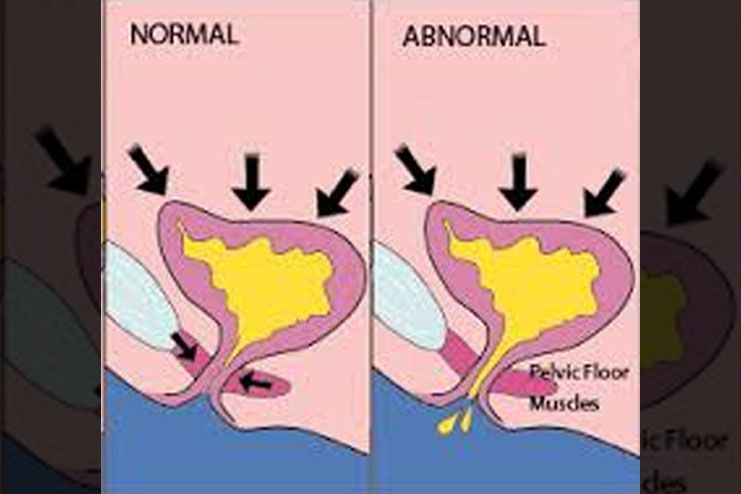

Following are the factors that add on to the risk of urinary incontinence :
- It is risky for women to get stress urinary incontinence during child birth and menopause. In case of men, the risk of being affected by urge incontinence is higher because they often end up getting problems in the prostate glands
- There is a risk of getting urine incontinence as you age
- Being obese can also cause problems with urine leakage
- There are chances of getting affected by urine incontinence when it is genetic
- Being affected by certain diseases can also have a counter effect of experiencing urine incontinence
Ways to Prevent Urinary Incontinence
To an extent one can prevent being affected by urinary incontinence and here are some of those ways :
- Try and keep up to a good BMI
- Ensure to give your body the right nutrients (fiber) which can effectively prevent urinary incontinence
- Do not excessively take in caffeine, tobacco, alcohol and food that is highly acidic
Diagnosis For Urinary incontinence


The basic step to go with is to consult a doctor who will give you a clear picture of the problem after taking certain tests and studying them.
Possibly your doctor will do a urine and blood test and check on generally how much does your bladder get empty.
In order to closely take a look at this case, your doctor might probe questions as to how often do you urinate and how many times does the urine leak. If the case needs more attention then you could also consult a urologist.
Treatment For Urinary Incontinence
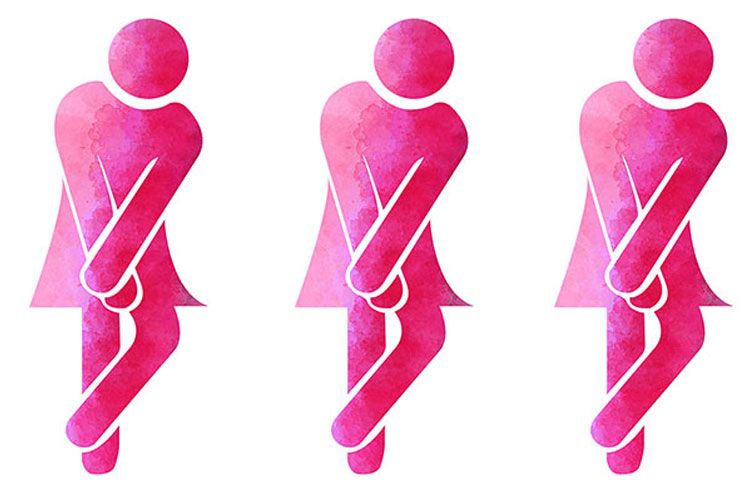

An advancement in science has evolved to that extent that earlier it was tough to treat urinary incontinence and now there are certain measures one can take to get rid of this problem. Having said, the treatment will vary based on the nature of urinary incontinence you are suffering with.
1. Sort to Kegel Exercises
Kegel exercises help in making your pelvic muscles robust. The advantage of making your bladder muscles stronger is to have better control on holding urine. You are bound to get rid of those problems of urine leakage because of coughing sneezing or laughing. It is a good exercise to try during pregnancy and child birth when you are at the verge of experiencing the symptoms
Here is a video to help you get on to kegel exercises
[embedyt] https://www.youtube.com/watch?v=wmEbW68YZuw[/embedyt]
2. Bring a difference in your habits
Watch out on all those activities that could prevent or reduce urinary incontinence. This is what you can do :
- Work on ways to lose weight.
- Majorly cut down or even avoid having beverages and alcohol.
- Quit the habit of smoking.
- Ensure to be safe when you are lifting heavy weights, use the right technique to do it.
- Drink lots of water that can help in certain types of urinary incontinence
3. Get control over your bladder
This treatment emphasizes on helping you reduce the frequency in urinating, it is not achievable at once. However, you have to tune the no of times you go to use the restroom. Try this method by controlling your urge to urinate every time you feel like urinating.
4. Follow a trick to urinate
In case of overflow incontinence, you should work on emptying your bladder. All you can do is, after you are done urinating try and urinate another time after a while. This will help treat urinary incontinence in a small way.
5. Set a pattern
Ensure to go and urinate every few hours in order to get accustomed to a certain behaviour pattern of keeping the urinary incontinence in control.
6. Electrical Stimulation to strengthen muscles
This is a method of inducing electrodes into the rectum or vagina to help in strengthening the pelvic floor muscles, this is suitable in case of stress incontinence. It can be a tedious process as one would need a few months of time to go by this method of treatment.
One should go about trying this treatment only with the recommendation of a physician.
7. Go for alpha blockers
This treatment is useful for men. Alpha blockers are a source of strength to your muscles and help in a smooth function of the blood vessels. These alpha blockers pave way for a smooth urine flow in men who are suffering with a prostate.
8. Sort to Products
In case no treatment is working a way for you, then you can use products that can help you deal with urinary incontinence. It depends on the type of incontinence you are going through.
- You can use a catheter in case your bladder does not get empty fully. Catheter is a small tube that can be put into the urethra in order to empty the urine in your bladder.
- If there are a few drops of urine leaking, a man can use this pad by wearing it over the penis in a way that it fits right in the underwear.
9. Focused Nutrients
The two important nutrients that the body will need to treat incontinence is magnesium and Vitamin D. Magnesium is advantageous to ensure the right muscle and nerve functioning. It is believed by some of the doctors that magnesium will completely help in getting rid of bladder related issues. Based on one of the research, few women tried taking magnesium pills and they saw an improvement in their urinary incontinence. The frequency of urinating decreased over night.
Vitamin D is an essential element to have healthy bones as it brings up the calcium levels in the body as well. Based on a study, women who take Vitamin D are not prone to get any issues with their pelvic floor muscles.
Whether or not urinary incontinence can be treated, it is mandatory to take all the precautions and go for the right treatment that can rid you off the illness. Follow the right things to stay away from urinary incontinence.



























